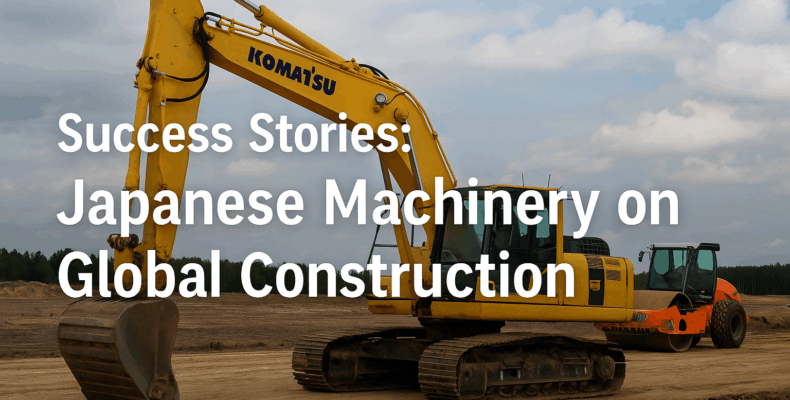When it comes to building bridges, roads, and high-rise structures, contractors across the globe rely on trusted machinery. Japanese construction equipment, known for its durability, efficiency, and easy maintenance, has become a top choice on international job sites. In this article, we’ll dive into real-world case studies that highlight the value of Japanese machinery in global operations—especially in emerging markets like Africa, Southeast Asia, and South America.
Why Japanese Machinery Is Trusted Globally
First, let’s explore why so many contractors choose used Japanese machines. Brands like Komatsu, Hitachi, Kobelco, and Mitsubishi have built reputations over decades. Their machines are rugged, fuel-efficient, and designed to handle tough environments. Moreover, spare parts are widely available, which makes maintenance affordable and fast.
Additionally, used Japanese construction machines undergo strict inspections and are often reconditioned before export. That means international buyers can expect high performance at a reasonable cost.
Case Study 1: Roadwork in Kenya with Komatsu Graders
In Kenya, infrastructure development is booming. A local contractor purchased a used Komatsu GD605A grader from Japan through a trusted exporter. The machine was delivered fully functional with minimal hours. Within a week, it was deployed for road leveling on a 35km highway project.
Result: The project timeline improved by 20%, and the company saved over $30,000 compared to buying new equipment locally.
Case Study 2: Bridge Construction in the Philippines with Hitachi Excavators
Next, we head to the Philippines. A civil engineering company needed reliable excavators for piling and trench work. They acquired two Hitachi ZX200 units from Japan. Thanks to fuel efficiency and operator comfort, both machines worked long shifts with minimal breakdowns.
Result: The bridge’s foundation was completed ahead of schedule, and maintenance costs were 40% lower than expected.
Case Study 3: Rural Development Projects in Ghana Using Kobelco Backhoes
In Ghana, Japanese used backhoes support rural water and school construction projects. A government-backed initiative sourced Kobelco SK60SR units at half the price of new imports. These compact machines were easy to transport, fuel-efficient, and well-suited for confined spaces.
Result: The program delivered over 100 infrastructure projects in 18 months with consistently low machine downtime.
Benefits Seen Across All Cases
Across these examples, we see common themes:
-
Lower costs with high equipment reliability
-
Reduced maintenance times thanks to spare part availability
-
Efficient shipping due to compact machine sizes
-
Increased project productivity, helping firms stay ahead of deadlines
These benefits have made used Japanese construction machines a smart investment worldwide.
Where to Find Trusted Exporters
Choosing the right supplier is critical. Machines must be inspected, maintained, and ready to perform upon arrival. We recommend reviewing the following page before purchasing:
👉 Top 5 Trusted Japanese Used Truck Exporters for Global Buyers
This list highlights exporters with a proven track record in shipping high-quality used machinery—including tractors, buses, trucks, and construction equipment—to over 100 countries.
Final Thoughts
As infrastructure demands grow across Africa, Asia, and Latin America, the need for dependable, cost-effective machinery is higher than ever. Japanese used equipment offers a balance of performance, longevity, and value. By learning from real-world case studies, global contractors can make informed decisions that fuel success on their construction sites.
Don’t just buy any machine—invest in a solution that delivers results from day one.
